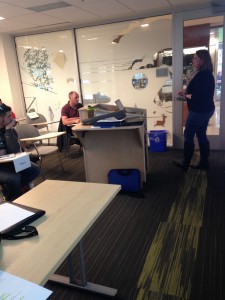I have always described myself as upbeat and chipper. I have rarely met a stranger, and will talk to anyone. I talk to animals, to myself, and sometimes even to the walls. I am outgoing.
So, the other day when I was at Panera for lunch, I didn’t hesitate to chat with the guy behind the counter, making and bagging the food. As he bagged the food and called the customers’ names in front of me, the interaction, or complete lack thereof, saddened me. Every customer just grimly took their food, ignoring the gentleman behind the counter and no one even uttered “Thank you.”
He prepared my food next and we made eye contact. Without hesitation I said “Hello!” and asked how his day was. He smiled and we started chatting. He handed me my food and told me, “Thank you, you made my whole day.”
I teared up a little as I walked out the door. Someone who works with people all day, and this tiny minute of conversation – just a little common courtesy – made his day.
This led me to wonder, how many people do we just pass by, do we not engage with, do we never say “Thank you” to? A little common courtesy can make all the difference to someone.



